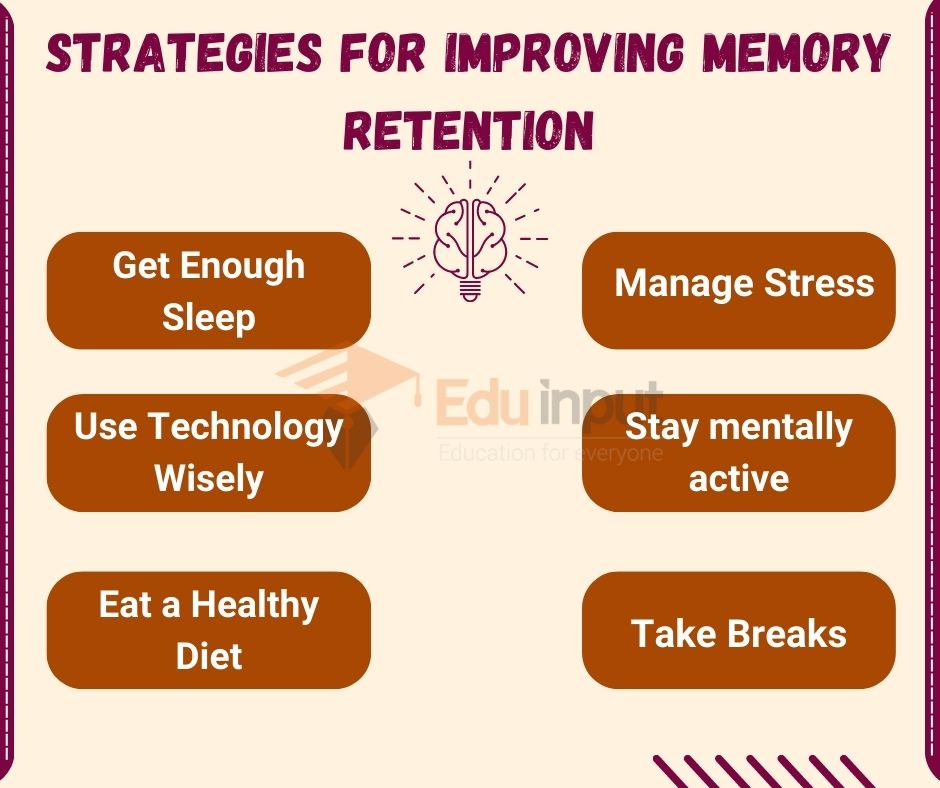Strategies for Improving Memory Retention While Studying
As students, we are often tasked with memorizing large amounts of information in a short amount of time. Whether it’s preparing for a test, giving a presentation, or just trying to learn something new, the ability to retain information is crucial for success. There are some Strategies for Improving Memory Retention While Studying.
Understanding the Memory Process
Before diving into specific strategies, it’s important to understand how memory works. Memory is a complex process that involves several stages, including encoding, storage, and retrieval. In order to improve memory retention, it’s important to optimize each of these stages.
Encoding
Encoding is the process of taking in new information and converting it into a form that can be stored in memory. One of the most effective ways to improve encoding is to engage in active learning. This involves actively processing and manipulating information, rather than just passively reading or listening to it. Some effective active learning techniques include:
- Summarizing the information in your own words
- Creating flashcards or other study aids
- Teaching the material to someone else
- Relating the information to something you already know
Storage
Storage is the process of retaining information over time. One of the most effective ways to improve storage is through repetition. Repeating information over and over helps to strengthen the neural connections in your brain that are associated with that information. Some effective repetition techniques include:
- Spaced repetition, where you review information at increasing intervals over time
- Retrieval practice, where you actively recall information from memory
- Distributed practice, where you space out your study sessions over a longer period of time

Retrieval
Retrieval is the process of accessing information from memory when it’s needed. One of the most effective ways to improve retrieval is through context-dependent learning. This involves studying and practicing in an environment that is similar to the one where you will need to recall the information.
For example, if you need to give a presentation in a specific room, practicing in that room beforehand can help improve your ability to recall the information during the actual presentation.
Strategies for Improving Memory Retention
Now that we understand the memory process, let’s look at some specific strategies for improving memory retention while studying.

Get Enough Sleep
Sleep plays a critical role in memory consolidation, the process of transferring information from short-term memory to long-term memory. Getting enough sleep can help improve memory retention, while sleep deprivation can impair it. Aim for 7-8 hours of sleep per night to give your brain the rest it needs to consolidate memories.

Use Mnemonic Devices
Mnemonic devices are memory aids that help you remember information by associating it with something else. Some common mnemonic devices include acronyms, acrostics, and rhymes. For example, to remember the order of operations in math (parentheses, exponents, multiplication, division, addition, subtraction), you could use the acronym PEMDAS (Please Excuse My Dear Aunt Sally).
Break Information into Chunks
Breaking information into smaller chunks can make it easier to remember. This is known as chunking. For example, if you’re trying to remember a phone number, you might break it up into smaller chunks (e.g. 555-123-4567 becomes 555-1234-567). This makes the information more manageable and easier to remember.
Practice Retrieval
As we mentioned earlier, retrieval practice is an effective way to improve memory retention. Try actively recalling information from memory instead of just re-reading it. This could involve creating flashcards, taking practice tests, or just trying to recall information from memory without any cues.
Using Visualization
Visualization involves creating mental images to represent information. This can help make the information more memorable and easier to recall. For example, if you’re trying to remember a list of items, you might create a mental image of each item and how it relates to the others on the list.
Stay Focused
Staying focused is crucial for effective studying and memory retention. Minimize distractions and try to create a quiet, comfortable environment for studying. If you find yourself getting distracted, try taking breaks or changing your study location.
Get Active
Exercise is not only good for your physical health, but it can also help improve memory retention. Physical activity has been shown to increase blood flow to the brain, which can help improve cognitive function. Try incorporating some exercise into your daily routine to help improve your memory retention.
Eat a Healthy Diet
Eating a healthy diet can also help improve memory retention. Certain foods, such as fruits, vegetables, whole grains, and lean protein, have been shown to have cognitive benefits. On the other hand, sugary and processed foods can impair cognitive function. Aim for a balanced, nutritious diet to help optimize your brain function.

Take Breaks
Taking breaks is important for both your physical and mental health, as well as your memory retention. Studies have shown that taking breaks during studying can help improve focus and retention. Try taking short breaks every 30-45 minutes to help recharge your brain.
Use Technology Wisely
Technology can be a useful tool for studying and memory retention, but it can also be a distraction. Use technology wisely by minimizing distractions and using tools that can help you study more effectively, such as flashcard apps or note-taking software.
Manage Stress
Stress can have a negative impact on cognitive function and memory retention. Try to manage stress through relaxation techniques, such as deep breathing, meditation, or yoga. Taking care of your mental health can help improve your ability to learn and remember new information.




Leave a Reply